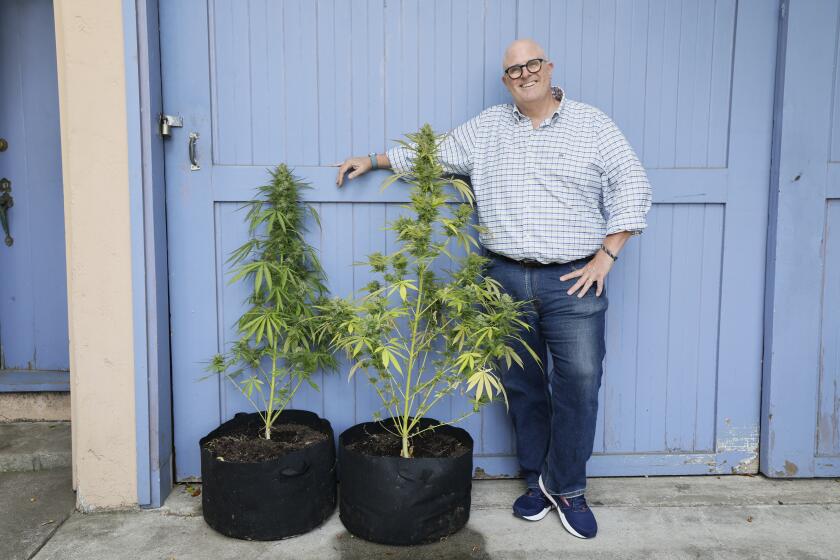Woodland Hills Orange Grove Bears a Special Kind of Fruit
The sun is drying away the morning haze in Woodland Hills, giving itself a clear view of Ann Bothwell’s bit of living history. It’s burnishing the dark green leaves of the 1,987 trees and settling in the pores of the hard infant fruit.
Thus begins another day in what is believed to be the last commercial orange grove in the San Fernando Valley.
Two-thirds of a century ago, citrus groves covered 15,000 acres of the Valley. Since then, population movements and economics have conspired to make Valley land too dear to be farmed when it might be converted to housing, shopping centers and freeways.
The robust Valley orange industry thus has dwindled to the 80-year-old widow and her 14-acre Bothwell Ranch south of Ventura Boulevard, the final one-thousandth of the once grand totality.
“It brings me up short when I think of it every once in a while, that it’s the last of its kind,” Bothwell said. “But somebody has to be first, and somebody has to be last.”
Other orange groves exist in the Valley. Cal State Northridge maintains an eight-acre grove on Nordhoff Avenue, and the Los Angeles Recreation and Parks Department keeps a grove of about 12 acres at its Orcutt Ranch. Similarly, a 1.5-acre orange-and-lemon grove is part of the grounds of Alemany High School, adjacent to San Fernando Mission in Mission Hills.
None of these, however, is commercially farmed. Typically, the fruit is harvested by the public on a pick-your-own basis, or by nonprofit community organizations. Alemany High makes use of its fruit in its own cafeteria.
Private Valley growers who have tried to continue raising oranges for profit have succumbed to rising costs. Water, which must be given in abundance to orange trees, became more expensive in the mid-1980s when the Los Angeles Department of Water and Power discontinued its bargain agricultural rate for Valley farms. Each watering of Ann Bothwell’s complete grove now costs about $1,200.
In addition, growers found over the years that increased labor costs made packinghouses less willing to pick and haul fruit from small groves.
“The last time I had my oranges picked, it cost me money,” said Joseph Newman of Chatsworth, whose four-acre grove on Winnetka Avenue in Monteria Estates hasn’t been farmed commercially for five years. “Labor costs now are prohibitive for such a small grove.”
Despite the unfavorable economics, Ann Bothwell has persevered, in no small part out of love.
Bothwell Ranch is a pristine place of weedless rows of Valencia orange trees, tidily graveled roads and shining, grove-green outbuildings trimmed in white. In aspect and feel, it is completely aberrant to the upscale suburban Woodland Hills neighborhood that surrounds it.
This is the slow time of year in the grove. Bothwell’s two full-time workers can do only some minimal trimming, discourage weeds and monitor the irrigation system, which is critical in the season of high heat. The tight green fruit, the size of pingpong balls, won’t be ready for harvesting until next July, when 25 or 30 pickers from a packing company will descend on the grove.
Bothwell came to live in the grove in 1948, after marrying its owner, agriculturist Lindley Bothwell. Her husband also owned a company that cared for groves from Santa Barbara to San Diego. As groves throughout Southern California disappeared beneath the onslaught of people, the Bothwells began concentrating on mail-order business. They shipped gift packs of fruit throughout the United States under the Bothwell Ranch label. That endeavor lasted until 1985, the year before Lindley Bothwell’s death.
Through it all, the orange grove endured, serving as the family’s idyllic homestead. It survived an attack of an airborne virus that necessitated the replacement of half of its trees. It survived frigid winter nights when the Bothwells hand-lit smudge pots, one for each tree, to maintain a viable temperature in the grove.
Ventura Boulevard as a two-lane road, and unbroken vistas stretching across the Valley are gone, too, replaced by the privacy walls of housing developments and the staccato sameness of tract homes.
“We’re overrun,” Bothwell said with a sigh. “But you can’t stand in the middle of Ventura Boulevard and say, ‘Stop!’ ”
The sheltering trees of the orange grove, however, ensure that within the boundaries of the Bothwell Ranch, an earlier way of Valley life abides. It is a life still there for the tasting by the 12 Bothwell great-grandchildren, who come to ride the tractors and play with Klondike, the resident German shepherd. Bothwell says imparting a sense of history to the young ones is a principal reason she holds on.
Other reasons exist, too. The early morning walks among the orange trees, watching Klondike chase the rabbits, for one. For another, the exceptional quiet, a result of the natural soundproofing the trees provide.
“Every once in a while on the front porch, if it’s still, we can hear the freeway,” Bothwell said.
“It depends on the wind drift. Once in a while we can hear the Southern Pacific above Nordhoff, if it’s very, very quiet at night. Other than that, you don’t hear a thing. An occasional owl. An occasional coyote.”
More to Read
Inside the business of entertainment
The Wide Shot brings you news, analysis and insights on everything from streaming wars to production — and what it all means for the future.
You may occasionally receive promotional content from the Los Angeles Times.










